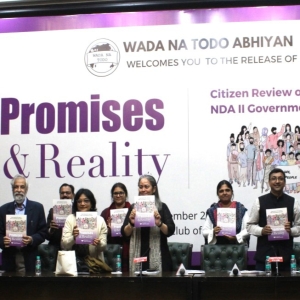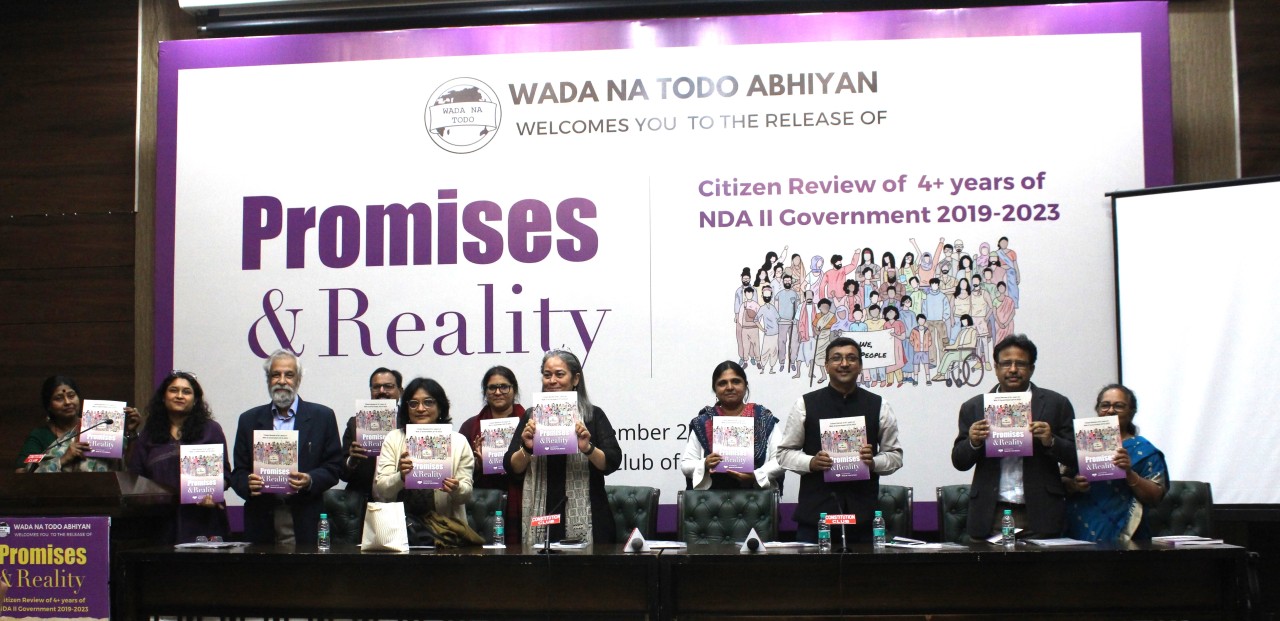
.png) Jacob Peenikaparambil
Jacob Peenikaparambil

Ram Madhav, president of India Foundation and a prominent figure in the Sangh Parivar, in his article titled, "Please Choose Wisely" (The Indian Express, May 19, 2024), urged Indian voters to elect the BJP for "stability, continuity and visionary leadership". He painted a picture of a new and ambitious India, ready to become a developed nation by the time it celebrates the centenary of independence in 2047. However, these promises seem more like a projection of the BJP's dream of being in power till 2047 rather than a realistic assessment of their performance.
While PM Modi and the top BJP leaders continue to spread divisive rhetoric in their election speeches, some, like Ram Madhav, attempt to justify why the electorate should vote for the BJP. However, the BJP's track record lacks substantial achievements over the past decade, and its future agenda to make India a Vishwaguru is equally unconvincing. This lack of progress and vision should be a cause for concern for all citizens.
The kind of derogatory language used by PM Modi and the BJP leaders doesn't need any repetition, as their hate speeches are widely circulated on social media platforms. They include confiscating Hindu property, including mangal sutras and buffaloes to be distributed among the Muslims, the opposition parties putting Babri Masjid lock on Ram Mandir, Congress bulldozing Ram Mandir, Congress spending 15% of the budget on Muslims, etc.
Political scientist Suhas Palshikar, in his article "A turn in the campaign" in The Indian Express on May 19, has pointed out that the BJP's change in narrative and its fallback to capitalising on Hindu-Muslim divisions is not the result of any confusion in its ranks but is part of its proven dual strategy of linking dreams of development with militant Hindutva. The central plank of the BJP has always been strident Hindutva.
According to Suhas, the BJP could hardly go on with a campaign of dreams and possibilities after two terms in office. Economic woes like surging unemployment and price rises faced by the electorate don't allow the BJP to bank upon its performance record. That is why the BJP is focusing on the Hindu-Muslim issues. The BJP cannot sustain the electorate's interest without stocking anxieties among the majority.
At the same time, for the consumption of foreign media and the English-speaking middle class in India, saffron intellectuals like Ram Madhav resort to developmental issues and try to present a rosy picture of the Modi era. A critical look at the achievements of the Modi government during the last decade, as described by Ram Madhav in his article, reveals that they are hollow.
The most important achievement highlighted by Ram Madhav is a "significant cultural transformation". "A culture of accountability in politics, transparency in the economy, stakeholdership in social life, autonomy in diplomacy and security and pride in civilisational and cultural identity is what new India stands for", he wrote.
Where was the culture of accountability in politics during the Modi regime? In a democracy, the executive branch is accountable to the Parliament and the people. Many crucial bills were hurriedly passed without referring to the parliamentary committees and without sufficient discussion.
Wada Na Todo Abhiyan, in its report "Promise and Reality 2019-2023," has published the following data regarding the passing of bills by the Parliament: "…during the Monsoon Session of the Indian Parliament in 2021, a staggering 18 Bills were passed, with a mere 34 minutes of discussion allotted for each. During the Monsoon Session of 2023 (held from July 20 to August 11), Lok Sabha passed 22 Bills. Twenty of these Bills were discussed for less than an hour before passing. Nine Bills, including the IIM (Amendment) Bill, 2023 and Inter-Services Organisation Bill 2023, were passed within 20 minutes in Lok Sabha. The Bills to create the National Nursing and Midwifery Commission and the National Dental Commission were discussed and passed together in Lok Sabha within three minutes," states the report. The three controversial Farm Bills were passed swiftly without involving the stakeholders, and they were also withdrawn without any discussion in Parliament.
Referring bills to Parliamentary Committees (Standing and ad hoc Committees) allows experts to study them in detail and elicits citizens' views. The Modi government gave scant attention to referring bills to parliamentary committees. For example, in the 2023 Monsoon session, 25 Bills were introduced, and only three were referred to committees. In the 17th Lok Sabha, only 17 per cent of Bills were directed to Committees, a lower figure than in the previous three Lok Sabhas.
Investigating agencies have been hunting the opposition party leaders on the issue of corruption. At the same time, no action was taken on the corruption charges pointed out in the report of the Controller and Auditor General of India (CAG). According to Wada Na Todo Abhiyan's report, "At least 12 CAG reports tabled in the Parliament in August 2023 revealed corruption and irregularities in the functioning of several Union government ministries and departments". Where is the Modi government accountable?
The media is crucial in holding the government accountable by publishing the truth about its functioning. Unfortunately, most of the press has become government advertising agencies, so much so that it is known by a new moniker – Godi Media. During the last ten years, PM Modi has not held a press conference nor given an unscripted interview with any journalist.
The second factor highlighted by Ram Madhav in his article is transparency in the economy. "Shedding evils like corruption, black markets and inefficiency, the Indian economy has surged ahead to scale new heights and emerged as a transparent, inclusive and citizen-friendly one", wrote Ram Madhav.
The Supreme Court declared the Electoral Bond scheme of funding political parties unconstitutional. It is the most secret and non-transparent method introduced by the Modi government and exposes how it fooled the people of India.
Another instance of the Modi government's non-transparency is the unprecedented reduction in the CAG reports related to the functioning of the Union Government's departments from 55 in 2015 to 14 in 2020, a fall of 75%. The CAG's constitutional responsibility is to promote financial accountability and transparency in the affairs of the audited entities. Defence audit reports went from seven in 2017 to zero in 2020.
The media reported that CAG officers who exposed corruption in government departments were transferred. For example, Dattaprasad Suryakant Shirsat, who was in charge of the performance audit of the Ayushman Bharat-Pradhan Mantri Jan Arogya Yojana, was one of the officers transferred. He had audited 964 hospitals in 161 districts of all 28 states and found that in 2.25 lakh cases, the date of the "surgery" was shown to be later than the date of discharge.
Ram Madhav's claim that the Indian economy has become inclusive is laughable. According to a working paper, "Income and Wealth Inequality in India, 1922-2023, the Rise of Billionaire Raj", published by World Inequality Lab in March 2024, the income and wealth share of the top 1% of the Indian population rose to 22.6% and 40.1% respectively in 2022-23.
The income and the wealth share of the top 1% of Indians is among the very highest in the world, higher than even South Africa, Brazil and the US. Government policies like a regressive income tax system and low investment in education are the main reasons for the big divide between the rich and the poor. The paper also said that the quality of economic data in India is notably poor and has recently declined.
India ranked 111th out of 125 countries in the Global Hunger Index 2023, with the highest child-wasting rate of 18.7%. India's neighbouring countries, Pakistan (102th), Bangladesh (81st) and Sri Lanka (60th), fared better than India in the index. India refuses to accept the report, accusing the publishing agency of using an unscientific methodology.
Although Narendra Modi had promised to generate two crore jobs every year in 2014, he has miserably failed. Today, youth unemployment in India is one of the highest in the world, nearly 23%, according to Parakala Prabhakar, a renowned political economist.
Ram Madhav has praised PM Modi for his participatory governance. "Prime Minister Narendra Modi has made conscious efforts in the last ten years to encourage participatory governance at the grassroots in the place of governance from the top", wrote Ram Madhav. Many political observers believe that under PM Narendra Modi, India has the most centralised governing system. According to Jairam Ramesh, former Union Minister and Congress leader, Modi runs the "most centralised government" in Indian history, marginalising even his cabinet, BJP and MPs.
The states are deprived of their financial autonomy. Through the introduction of GST, the states depend on the centre for their finances. Cooperative societies, on the state list and under the states, are brought under the central government. The three controversial agricultural laws were passed without discussing them with the state governments, although agriculture is on the state list. The disastrous lockdown was imposed on the people of India at the beginning of COVID-19 without any consultation with the states, and it resulted in untold miseries for the people of India, especially millions of migrant labourers.
According to Ram Madhav, reducing corruption is another feather in PM Modi's cap. "While there is a premium of honesty, Damocles' sword hangs over every corrupt leader", he wrote. The Electoral Bonds scheme has proved to be the biggest scam in India's history. Many companies raided by the CBI and ED, accused of corruption, were let off later when they made handsome contributions to the BJP through the Electoral Bonds.
According to a study by the Indian Express, since 2014, 25 opposition leaders facing corruption probes crossed over to the BJP, and 23 got a reprieve. Damocles' sword is hanging only on the opposition political leaders and the critics of the Modi government. The moment they cross over to the BJP, they are cleansed by the BJP's washing machine. Claiming that corruption is reduced under the Modi regime is nothing but hypocrisy. On the contrary, the corrupt get patronage and promotion under the Modi government if they are ready to switch their allegiance to PM Modi.
Ram Madhav's final argument is that the country is experiencing civilisational pride. "More and more Indians rise above narrow social, religious and other parochial schisms to proudly wear their cultural-civilisational identity on their sleeves", wrote Ram Madhav. Reality is just the opposite. Never in the history of independent India, the country has witnessed such a vicious atmosphere of hate, division, and hostility as found during the last decade. The poison of hate has been injected in high doses into the veins of Indian society. It may take a long time to detoxify Indian society and build peace and harmony to reclaim India's millennia-old heritage, Vasudhaiva Kutumbakam.